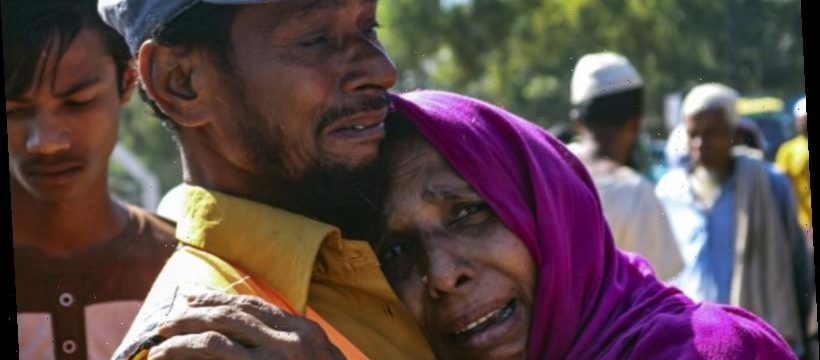Dhaka: Authorities in Bangladesh on Friday started sending more than 1,500 Rohingya refugees to an isolated island despite calls for a halt from human rights groups.
The 1,642 refugees were boarding seven Bangladeshi naval vessels in the port of Chittagong for the trip to Bhashan Char, according to an official, who could not be named in accordance with local practice.
Once regularly submerged by monsoon rains, the island now has flood protection embankments, houses, hospitals and mosques built at a cost of more than $112 million by the Bangladesh navy.
Rohingya refugees board a ship as they are ferried to Bhashan Char.Credit:AP
Located 34km from the mainland, the island surfaced only 20 years ago and has never been inhabited until now.
The United Nations has also voiced concern that refugees be allowed to make a “free and informed decision” about whether to relocate to the island in the Bay of Bengal.
"The government is not taking anyone to Bhashan Char forcibly. We maintain this position," Foreign Minister Abdul Momen told reporters late on Thursday.
But two Rohingya being relocated said their names appeared on lists compiled by government-appointed local leaders without their consent, while aid workers said officials used threats and enticements to pressure people into going.
‘They are taking us forcefully’: a Rohingya man comforts a refugee woman as they are relocated to Bhashan Char. Credit:AP
"They have taken us here forcefully," a 31-year-old man said tearfully by phone as he boarded a bus from the camps near Cox's Bazar. "Three days ago, when I heard that my family is on the list, I ran away from the block, but yesterday I was caught and taken here," he said.
An 18-year-old woman said her husband had put their names on the list thinking it was for food rations. He fled when they were told to go to Bhasan Char, she said, adding that she is also hiding in the camp.
The island’s facilities are built to accommodate 100,000 people, just a fraction of the million Rohingya Muslims who have fled waves of violent persecution in their native Myanmar and are currently living in crowded, squalid refugee camps.
On Thursday, 11 passenger buses carrying refugees left Cox’s Bazar district on the way to the island, where they are expected to arrive after an overnight stopover, a government official involved with the process said on condition of anonymity because he was not authorised to speak to the media.
He said “a few thousand” refugees were in the first batch. Authorities in Cox’s Bazar did not say how the refugees were selected for relocation.
About 700,000 Rohingya fled to the camps in Cox’s Bazar after August 2017, when the military in Buddhist-majority Myanmar began a harsh crackdown on the Muslim group following an attack by insurgents. The crackdown included rapes, killings and the torching of thousands of homes, and was termed ethnic cleansing by global rights groups and the UN.
Foreign media have not been permitted to visit the island.
Contractors say it is like a modern township, with multifamily concrete homes, schools, playgrounds and roads. It also has solar-power facilities, a water supply system and cyclone shelters.
International aid agencies and the UN have vehemently opposed the relocation since it was first proposed in 2015, expressing fear that a big storm could overwhelm the island and endanger thousands of lives.
The UN said in a statement on Wednesday that it has not been involved in preparations for the relocation or the selection of refugees and has limited information about the overall plan.
“The United Nations takes this opportunity to highlight its longstanding position that Rohingya refugees must be able to make a free and informed decision about relocating to Bhasan Char based upon relevant, accurate and updated information,” it said.
Amnesty International and Human Rights Watch urged the government to cancel the relocation plan.
Prime Minister Sheikh Hasina has repeatedly told the UN and other international partners that her administration would consult them before making a final decision on the relocation and that no refugees would be forced to move.
Bangladesh attempted to start sending refugees back to Myanmar under a bilateral framework last November, but no one was willing to go.
A UN-sponsored investigation in 2018 recommended the prosecution of Myanmar’s top military commanders on charges of genocide, war crimes and crimes against humanity for the violence against the Rohingya.
Myanmar is defending itself in the International Court of Justice in the Hague, Netherlands, after the West African nation of Gambia brought a case backed by the Organization for Islamic Cooperation, Canada and the Netherlands over the crackdown.
AP, Reuters
Most Viewed in World
Source: Read Full Article


